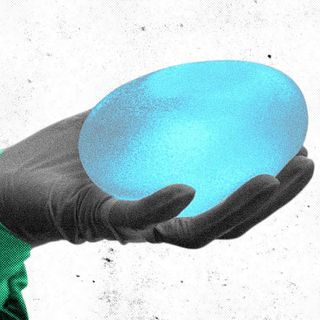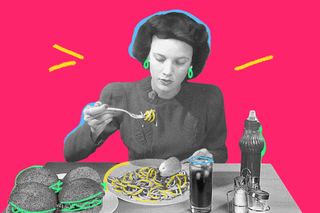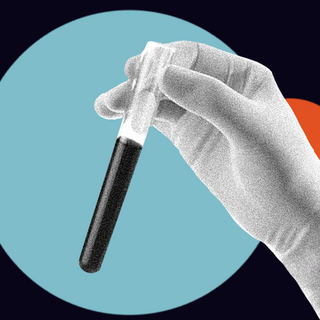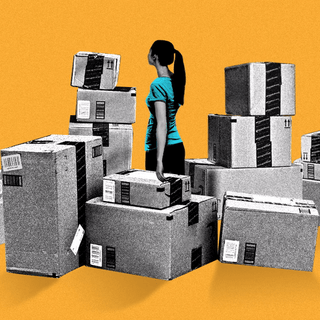
All You Need to Know About Binge Eating Disorder
Binge eating disorder is characterized by shame, distress, and emotional repercussions that are exacerbated by the stigma around obesity.

There’s a complex relationship we share with food, and it can quickly spiral into an illness that turns people’s minds against their bodies. “I’m in a self-loathing loop and can’t get out. I don’t know how to make the feelings of physical or emotional sickness go away,” said one Redditor, describing their feelings immediately after losing control and having a “massive binge.”
This is binge eating disorder (BED), and it’s now an official eating disorder diagnosis as per the Diagnostic and Statistical Manual of Mental Disorders, Fifth Edition (DSM-5). Estimates suggest that BED affects around 2% of the global population, and is associated with other physical health conditions such as diabetes, cholesterol, and more. But it’s recognized as a psychiatric condition for how it develops as a result of other factors, including trauma, pre-existing anxiety or depression, negative body image, and even genetics.
BED is different from other eating disorders in that it isn’t marked by “compensatory” behavior, such as purging. But beyond the physical discomfort of eating beyond one’s capacity or even when not hungry, BED is characterized by shame, distress, and emotional repercussions. Eating disorders on the whole are more common among women than men, but the ratio is almost evenly balanced when it comes to BED. Of all the eating disorders that men do suffer from, BED is the most common.
These are further that are exacerbated by the stigma around obesity. Eating disorders are perceived to be overwhelmingly about purging or reducing food intake. Binge eating is an unrecognized, and arguably, more stigmatized form of disordered eating that can arise out of trauma, which is invisibilized in healthcare and carries the taboo of obesity. Indeed, many people who suffer from BED are obese — adding to not only isolation but also medical neglect.
Related on The Swaddle:
New Research Identifies ‘Purging Disorder’ as Distinct From Bulimia
There’s a circular relationship between obesity, binge eating, and depression: “While being shamed for their weight can lead to binge-eating in some as a coping mechanism, putting them at greater “risk for experiencing more weight stigma,” according to [Leslie] Pristas [a bariatric surgeon], for some, the stigma surrounding weight-gain can lead to eating disorders too,” The Swaddle noted earlier.
BED is diagnosed when someone experiences at least one binge episode per week, and is classified as extreme when they experience 14 in the same time frame. But the most defining characteristic is feeling a loss of control: a person with BED may feel like they’re unable to exercise their will to stop eating during an episode, and immediately succumb to feelings of guilt, disgust, and shame for losing control.
Sometimes, people with BED may follow a “yo-yo” diet — where episodes of bingeing are followed by a period of dieting, only to be followed once again by bingeing. It also isn’t necessarily the case that people with BED are obese, but fatphobia nonetheless plays a role in guiding their illness and self-perception. Moreover, research found that people with BED have greater negative attitudes towards obesity — speaking to how the internalization of stigma around obesity plays a role in experiences of BED.
Related on The Swaddle:
Adolescents Are Falling Prey to Chew and Spit, a Relatively Unknown Eating Disorder
There’s a reason why the pervasive feeling of shame gets internalized by people suffering from BED themselves. A vignette study — that employs the use of short situational vignettes that participants respond to — assessed general attitudes towards different eating disorders, including BED, and mental illnesses like depression. The results showed that obese people across all samples were blamed for their condition more than anyone else. Further, a lack of self-discipline was attributed to patients who were obese or had BED. “Stigmatizing attitudes vary across mental health disorders, and future research should aim to specifically target stigmatizing beliefs to reduce and prevent discrimination toward mental health disorders and obesity,” the researchers note.
Cognitive Behavioral Therapy (CBT) and Dialectic Behavioral Therapy (DBT) are currently some of the treatment options for BED. But as per new research, there’s another route on the horizon. Published in Nature Medicine, researchers from the Perelman School of Medicine at the University of Pennsylvania found a brain stimulation treatment that helped address patients’ cravings. In clinical trials involving two patients, scientists inserted a small device in the region of their brain associated with processing feelings of pleasure and reward — and this is a region that’s also involved with addiction. When this part of the brain signaled food craving, the device imparted small electrical shocks — this then disrupted the craving signals.
What’s important to note is that these signals were distinctly associated with BED alone, and not with regular, non-binge eating. The breakthrough is significant in more ways than one: it shows that the disorder is serious but currently lacking long-term, viable treatments.
Rohitha Naraharisetty is a Senior Associate Editor at The Swaddle. She writes about the intersection of gender, caste, social movements, and pop culture. She can be found on Instagram at @rohitha_97 or on Twitter at @romimacaronii.
Related


40 Studies Found Presence of Toxic ‘Forever Chemicals’ in Umbilical Cord Blood
